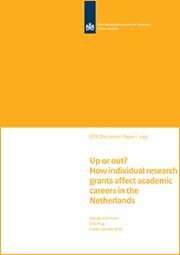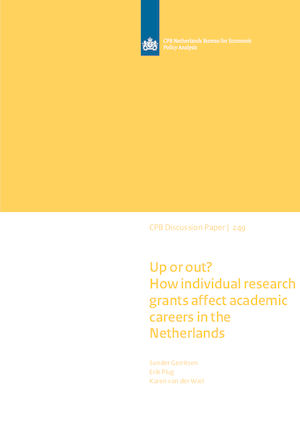Up or out? How individual research grants affect academic careers in the Netherlands

The main goal of this scheme of the Dutch Research Council is to provide relatively young, talented scientists with appealing career opportunities in academia. We find that the receipt of an IRI-grant enhances the probability of a successful career in science.
Read also: CPB Discussion Paper 248
We evaluate the causal effect of an IRI-grant on labor-market outcomes by taking advantage of the discontinuity in the relationship between the priority scores given to each application and the actual receipt of a grant. Six years after application, grant recipients are more likely to stay in academia (six percentage points), more likely to be a full professor (seven percentage points) and more likely to receive future grants (five percentage points). However, grant receipt does not yield higher wages. Apparently IRI-grantees are purely rewarded for winning a grant in terms of the opportunity to do their self-selected research. It seems likely that this free research time is combined with a lower teaching load. In addition, we find that successful applicants are not rewarded in terms of their contract type either. Six years after application, the probability to work on a permanent contract is ten percentage points smaller for the successful applicants. This is not only driven by those applicants leaving academia for a sector in which permanent contracts are more customary. Also within the large group of applicants who stay in academia, those who win an IRI-grant are less likely to have obtained a permanent contract.
This academic discussion paper is an example of CPB’s research on science policy. Another discussion paper is published simultaneously on the effects of STW-grants on scientific productivity and utilization (CPB Discussion Paper 248).
